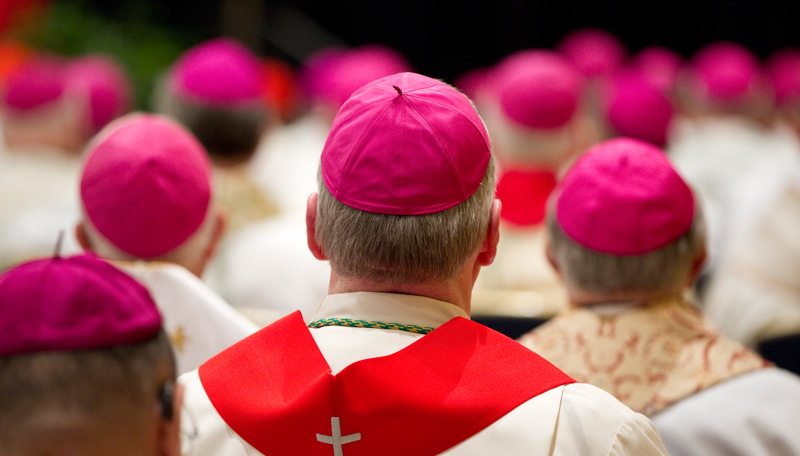A delegation from the United States Conference of Catholic Bishops will meet with Pope Francis today in the Vatican. Leading the delegation will be Cardinal DiNardo, the Archbishop of Galveston-Houston and president of the USCCB. He will be joined by the conference vice-president, Archbishop Gomez of Los Angeles, and Cardinal Sean O’Malley of Boston. Their objective is, on paper at least, straightforward: enlist the Holy Father’s support for their three-part plan to address the ongoing crisis in the American Church.
This might seem like an easy pitch, but the rapid escalation of this crisis has made things far more complicated than they might otherwise have been. If Pope Francis was cool toward the American episcopate before this summer, he surely hasn’t warmed since. With the publication of Archbishop Viganò’s testimony, Pope Francis, and certainly his advisors, seem convinced that a large part of this current outrage is an ideologically motivated attempt to cripple this pontificate.
Cardinal DiNardo’s statement as USCCB president set the benchmark for other bishops’ responses to the Viganò letter: “The questions raised deserve answers that are conclusive and based on evidence. Without those answers, innocent men may be tainted by false accusation and the guilty may be left to repeat sins of the past.” Such even-handedness was not the disavowal of Viganò that Rome (or certain American prelates named by Viganò) may have been hoping for.
But DiNardo’s statement was a clear message that he, and many of his fellow bishops, understand that what began as a re-emergence of the festering wound of clerical sexual abuse has metastasized into a full-scale crisis of confidence in the American episcopate.
The revelations about former-Cardinal McCarrick, the devastating report of the Pennsylvania Grand Jury, and the daily drip-drip-drip of new allegations about sexual misconduct (meaning, overwhelmingly, homosexual misconduct) in seminaries and among priests has given rise to a crescendo of righteous anger from the exasperated faithful.
Catholics fumed at the reports of decades-old clerical sexual abuse and then raged at the flaccid placations being offered by men who seem more concerned with defending their own reputations and agendas than their own flocks. Too many bishops were either complicit in the lies and deceit that allowed this rot to fester and flourish, too incompetent or out-of-touch to see what was going on right under their noses, or too pusillanimous to do anything about it. (That this is not a uniquely American problem is little consolation.)

It is right to note, as many bishops have in the wake of the Pennsylvania Grand Jury report, that the vast majority of instances of clerical sexual abuse involving minors happened decades ago. It also must be noted how little that fact does to assuage the anger of the faithful who have been misled and betrayed by the bishops we have right now. As Bishop Thomas Daly of Spokane put it recently: “Certain bishops in this country gave stones when the laity asked for bread.”
As Cardinals Cupich and Wuerl both managed to demonstrate in recent weeks, misjudging the nature and gravity of the situation could quickly make it worse. And this, too, is something the USCCB delegation must convey to the Holy Father: Any Apostolic Visitation must investigate, not only Theodore McCarrick himself, but the networks of influence and patronage that allowed him to flourish, no matter where those networks lead.
Anyone with even a passing familiarity with the Viganò testimony will immediately recognize why this might be an uncomfortable thing to ask from Pope Francis. But it’s a request that must be made, and one that ought to be granted for the good of the Church.
Whatever the fruits of today’s meeting between the USCCB delegation and Pope Francis, it’s essential to understand that the reform the Church in the United States needs will come with and through the pope and his brother bishops – with and through Peter and his fellow apostles – or it will not come.
The press can shine a bright light into dark places, but they cannot replace the need for good and faithful clergy. All the district attorneys and all the grand juries in all the land can’t renew the Catholic Church. They can bankrupt dioceses and religious orders, they can jail abusive priests and criminally negligent bishops, but they can neither strip them of their office nor replace them with the God-fearing shepherds we need.
And here there is cause for watchfulness, but not for despair. There are 196 dioceses in this country (and one Personal Ordinariate) and more than 450 bishops. Among these ranks are some scoundrels, sure, but also some good and holy men. And there will be more. Many priests who will be bishops someday are being strengthened even now by this time of testing and purification.
Reaffirming that our faith is in Christ – not bishops, priests, or popes – is good and true; but that can’t diminish the fact that it was Christ Himself who chose to entrust the governance of the Church to mere men. “Wherever the bishop shall appear,” wrote St. Ignatius of Antioch, “there let the multitude of the people also be; even as wherever Jesus Christ is, there is the Catholic Church.”
We lay men and women should pray for our bishops, make sacrifices for them, and even be willing to suffer for them – not because they deserve it, but because they need our help as much as we need theirs. And those of us who aren’t bishops owe it to those who are to speak plainly, even when – perhaps especially when – the truths being told are hard ones.
In the coming weeks and months, this space will be dedicated to just that: one layman’s look at the bishops into whose care we have been entrusted, for better and for worse, for their sake and ours.














